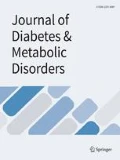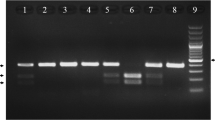Abstract
Purpose
Mutation in various regions of the adiponectin (ADIPOQ) gene is described to be associated with type 2 diabetes (T2D). Our aim was to investigate the association between rs1501299 (SNP + 276 G > T) and rs266729 (SNP-11377 C > G) polymorphisms of ADIPOQ gene and susceptibility to T2D in an Iranian population.
Methods
This is a case-control study. A total of 210 subjects including 100 patients with T2D and 110 healthy controls were selected from an Iranian population. SNP-11377 C > G and SNP + 276 G > T polymorphisms were investigated using the Tetra ARMS-PCR method.
Results
The genotypes frequency of the SNP-11377 C > G polymorphism (P = 0.21) and SNP + 276 G > T polymorphism (P = 0.10) were in agreement with the Hardy-Weinberg equilibrium. The genotype and allele frequencies for rs266729 polymorphism showed a significant difference between the T2D and control groups. Further, the frequencies of the genotypes of GG (OR = 2.43, P = 0.031), GG + GG (OR = 2.11, P < 0.01) and G allele (OR = 1.6, P = 0.041) in SNP-11377 C > G polymorphism was significantly associated with an increased risk of T2D compared to control group. While, there was no significant association between the different genotypes of SNP + 276 G > T polymorphism and the risk of T2D in an Iranian population. The circulating adiponectin level in T2D subjects had significant difference compared to the control group in rs266729 polymorphism.
Conclusion
We concluded that ADIPOQ rs266729 (SNP-11377 C > G) gene polymorphism but no rs1501299 is associated with increased risk of T2D in our population.


Similar content being viewed by others
Abbreviations
- Tetra ARMS-PCR:
-
tetra primer amplification refractory mutation system-polymerase chain reaction
- T2D:
-
type 2 diabetes
- WHO:
-
world health organization
- ADIPOQ:
-
the gene coding of adiponectin
- FPG:
-
fasting plasma glucose
- TG:
-
triglyceride
- HDL-C:
-
high- density lipoprotein-cholesterol
- LDL-C:
-
low-density lipoprotein- cholesterol
- HWE:
-
Hardy-Weinberg Equilibrium
- HOMA-IR:
-
homeostatic model assessment of insulin resistance
- GDM:
-
gestational diabetes mellitus
- NAFLD:
-
non-alcoholic fatty liver disease.
References
Meshkani R, Adeli K. Hepatic insulin resistance, metabolic syndrome and cardiovascular disease. Clin Biochem. 2009;42(13–14):1331–46.
Murea M, Ma L, Freedman BI. Genetic and environmental factors associated with type 2 diabetes and diabetic vascular complications. Review Diabet Stud. 2012;9(1):6–22.
Haghighatdoost F, Gholami A, Hariri M. Alpha-lipoic acid effect on leptin and adiponectin concentrations: a systematic review and meta-analysis of randomized controlled trials. European journal of clinical pharmacology. 2020;76(5):649–57.
Lim S, Quon MJ, Koh KK. Modulation of adiponectin as a potential therapeutic strategy. Atherosclerosis. 2014;233(2):721–8.
Kadowaki T, Yamauchi T, Kubota N, Hara K, Ueki K, Tobe K. Adiponectin and adiponectin receptors in insulin resistance, diabetes, and the metabolic syndrome. J Clin Invest. 2006;116(7):1784–92.
Woo Y-C, Tso AWK, Xu A, Law LSC, Fong CHY, Lam TH, et al. Combined use of serum adiponectin and tumor necrosis factor-alpha receptor 2 levels was comparable to 2-hour post-load glucose in diabetes prediction. PLoS One. 2012;7(5):e36868.
Oh YJ, Nam HK, Rhie YJ, Park SH, Lee KH. Low serum adiponectin levels in Korean children with a family history of type 2 diabetes mellitus. Horm Res Paediatr. 2012;77(6):382–7.
Hosseini H, Teimouri M, Shabani M, Koushki M, Babaei Khorzoughi R, Namvarjah F, et al. Resveratrol alleviates non-alcoholic fatty liver disease through epigenetic modification of the Nrf2 signaling pathway. Int J Biochem Cell Biol. 2020;119:105667.
Mohammadzadeh G, Zarghami N. Associations between single-nucleotide polymorphisms of the adiponectin gene, serum adiponectin levels and increased risk of type 2 diabetes mellitus in Iranian obese individuals. Scand J Clin Lab Invest. 2009;69(7):764–71.
Hara K, Boutin P, Mori Y, Tobe K, Dina C, Yasuda K, et al. Genetic variation in the gene encoding adiponectin is associated with an increased risk of type 2 diabetes in the Japanese population. Diabetes. 2002;51(2):536–40.
Stumvoll M, Tschritter O, Fritsche A, Staiger H, Renn W, Weisser M, et al. Association of the TG polymorphism in adiponectin (exon 2) with obesity and insulin sensitivity: interaction with family history of type 2 diabetes. Diabetes. 2002;51(1):37–41.
Li Y-Y, et al. Adiponectin-11377CG gene polymorphism and type 2 diabetes mellitus in the Chinese population: a meta-analysis of 6425 subjects. PloS one. 2013;8(4):e61153.
Hsiao T-J, Lin E. A validation study of adiponectin rs266729 gene variant with type 2 diabetes, obesity, and metabolic phenotypes in a Taiwanese population. Biochem Genet. 2016;54(6):830–41.
Richardson D, et al. Association between variants in the genes for adiponectin and its receptors with insulin resistance syndrome (IRS)-related phenotypes in Mexican Americans. Diabetologia. 2006;49(10):2317–28.
Yoshioka K, Yoshida T, Umekawa T, Kogure A, Takakura Y, Toda H, et al. Adiponectin gene polymorphism (G276T) is not associated with incipient diabetic nephropathy in Japanese type 2 diabetic patients. Metabolism. 2004;53(9):1223–6.
Hartl DL, Clark AG, Clark AG. Principles of population genetics, vol. 116. Sunderland: Sinauer associates; 1997.
Siitonen N, Pulkkinen L, Lindström J, Kolehmainen M, Eriksson JG, Venojärvi M, et al. Association of ADIPOQ gene variants with body weight, type 2 diabetes and serum adiponectin concentrations: the Finnish diabetes prevention study. BMC Med Genet. 2011;12(1):5.
Kaftan AN, Hussain MK. Association of adiponectin gene polymorphism rs266729 with type two diabetes mellitus in Iraqi population. A pilot study. Gene. 2015;570(1):95–9.
Populaire C, Mori Y, Dina C, Vasseur F, Vaxillaire M, Kadowaki T, et al. Does the− 11377 promoter variant of APM1 gene contribute to the genetic risk for type 2 diabetes mellitus in Japanese families? Diabetologia. 2003;46(3):443–5.
Palit SP, et al. A genetic analysis identifies a haplotype at adiponectin locus: association with obesity and type 2 diabetes. Sci Rep. 2020;10(1):1–10.
Chiodini BD, Specchia C, Gori F, Barlera S, D'Orazio A, Pietri S, et al. Adiponectin gene polymorphisms and their effect on the risk of myocardial infarction and type 2 diabetes: an association study in an Italian population. Ther Adv Cardiovasc Dis. 2010;4(4):223–30.
Nomani H, Hesami O, Vaisi-Raygani A, Tanhapour M, Bahrehmand F, Rahimi Z, et al. Association between the− 11377 C/G and− 11391 G/a polymorphisms of adiponectin gene and adiponectin levels with susceptibility to type 1 and type 2 diabetes mellitus in population from the west of Iran, correlation with lipid profile. J Cell Biochem. 2019;120(3):3574–82.
Cruz M, Garcia-Macedo R, Garcia-Valerio Y, Gutierrez M, Medina-Navarro R, Duran G, et al. Low adiponectin levels predict type 2 diabetes in Mexican children. Diabetes Care. 2004;27(6):1451–3.
Yamamoto S, Matsushita Y, Nakagawa T, Hayashi T, Noda M, Mizoue T. Circulating adiponectin levels and risk of type 2 diabetes in the Japanese. Nutr Diabetes. 2014;4(8):e130.
Cui M, Gao Y, Zhao Y, Pang H, Chen L, Wang Z, et al. Association between Adiponectin gene polymorphism and environmental risk factors of type 2 diabetes mellitus among the Chinese population in Hohhot. Biomed Res Int. 2020;2020:1–9.
Farooq R, Majid S, Ahmad Bhat S, Amin S, Hayat Bhat M, Ahmad Wani H, et al. Association of adiponectin gene polymorphism with type 2 diabetes and metabolic syndrome. Trans Metab Syndr Res. 2018;1:39–47.
Vasseur F, Helbecque N, Dina C, Lobbens S, Delannoy V, Gaget S, et al. Single-nucleotide polymorphism haplotypes in the both proximal promoter and exon 3 of the APM1 gene modulate adipocyte-secreted adiponectin hormone levels and contribute to the genetic risk for type 2 diabetes in French Caucasians. Hum Mol Genet. 2002;11(21):2607–14.
Hotta K, Funahashi T, Arita Y, Takahashi M, Matsuda M, Okamoto Y, et al. Plasma concentrations of a novel, adipose-specific protein, adiponectin, in type 2 diabetic patients. Arterioscler Thromb Vasc Biol. 2000;20(6):1595–9.
Ramya K, Ayyappa KA, Ghosh S, Mohan V, Radha V. Genetic association of ADIPOQ gene variants with type 2 diabetes, obesity and serum adiponectin levels in south Indian population. Gene. 2013;532(2):253–62.
Gu HF, Abulaiti A, Ostenson CG, Humphreys K, Wahlestedt C, Brookes AJ, et al. Single nucleotide polymorphisms in the proximal promoter region of the adiponectin (APM1) gene are associated with type 2 diabetes in Swedish caucasians. Diabetes. 2004;53(suppl 1):S31–5.
Kang ES, Park SY, Kim HJ, Ahn CW, Nam M, Cha BS, et al. The influence of adiponectin gene polymorphism on the rosiglitazone response in patients with type 2 diabetes. Diabetes Care. 2005;28(5):1139–44.
Menzaghi C, Ercolino T, Salvemini L, Coco A, Kim SH, Fini G, et al. Multigenic control of serum adiponectin levels: evidence for a role of the APM1 gene and a locus on 14q13. Physiol Genomics. 2004;19(2):170–4.
Li Y, Li X, Shi L, Yang M, Yang Y, Tao W, et al. Association of adiponectin SNP+ 45 and SNP+ 276 with type 2 diabetes in Han Chinese populations: a meta-analysis of 26 case-control studies. PLoS One. 2011;6(5):e19686.
Abd-Elbaky AE, et al. Adiponectin (+ 276 G/T), Tumor Necrosis Factor-alpha (−308 G/A) and Interleukin-6 (−174 C/G) Genes Polymorphisms in Egyptian Type 2 Diabetic Patients. J Diabetes Metab. 2016;7(6):1–10.
Farooq R, Amin S, Hayat Bhat M, Malik R, Wani HA, Majid S. Type 2 diabetes and metabolic syndrome–adipokine levels and effect of drugs. Gynecol Endocrinol. 2017;33(1):75–8.
Booth FW, Roberts CK, Laye MJ. Lack of exercise is a major cause of chronic diseases. Compr Physiol. 2011;2(2):1143–211.
Prakash J, et al. Association of adiponectin gene polymorphism with adiponectin levels and risk for insulin resistance syndrome. International journal of preventive medicine. 2015;6:31. https://doi.org/10.4103/2008-7802.154773.
Acknowledgements
We would like to thank the staff of Department of chemistry, Shahrood Branch, Islamic Azad University.
Availability of data and materials
Data of this study are included in the article and the primary data can be provided from the corresponding author.
Funding
The authors received no specific funding for this work. This is a part of the results of first author’s Ph.D thesis (M.A).
Author information
Authors and Affiliations
Contributions
MA and MT.G conceptualized and designed the research, MT.G and MN critically reviewed the manuscript and approved the final manuscript as submitted. MA and MT.G wrote the draft of this paper and all authors have directly participated in the Data collection, statistical analyses and Data interpretation.
Corresponding author
Ethics declarations
The experiments were approved by the Ethics Committee of Department of chemistry, Shahrood Branch, Islamic Azad University. Written informed consent was obtained from every participant.
Consent for publication
All the authors consented to the publication of this article.
Conflict of interests
The authors declare that they have no competing interests.
Additional information
Publisher’s note
Springer Nature remains neutral with regard to jurisdictional claims in published maps and institutional affiliations.
Rights and permissions
About this article
Cite this article
Alimi, M., Goodarzi, M.T. & Nekoei, M. Association of ADIPOQ rs266729 and rs1501299 gene polymorphisms and circulating adiponectin level with the risk of type 2 diabetes in a population of Iran: a case-control study. J Diabetes Metab Disord 20, 87–93 (2021). https://doi.org/10.1007/s40200-020-00715-w
Received:
Accepted:
Published:
Issue Date:
DOI: https://doi.org/10.1007/s40200-020-00715-w



